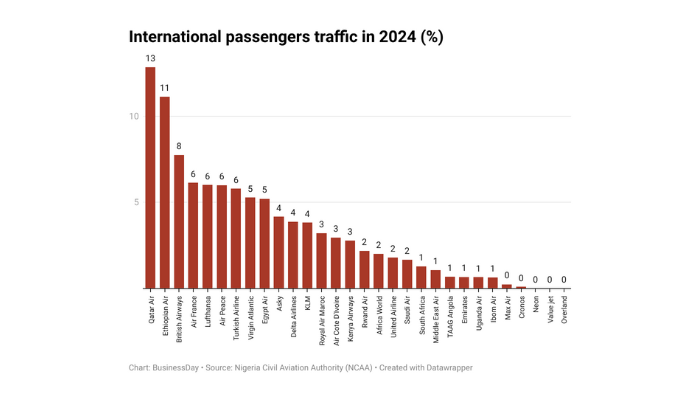Nigerian airlines are currently missing out on a major opportunity to earn revenue from the international air travel market, which is estimated to be worth over N8 trillion. The main reason for this loss is the limited capacity of local airlines, which has made it hard for them to compete with foreign carriers that dominate international routes in and out of Nigeria.
Airlines like Air Peace, Arik Air, and Dana Air have not been able to fully grow their international operations due to small fleet sizes, high operating costs, poor infrastructure, and tight government regulations. For example, Air Peace has made efforts to launch international routes to cities like Johannesburg and Dubai, but the airline often faces problems such as not having enough planes available, delays in aircraft maintenance, and difficulty getting slots at foreign airports.
According to recent reports, these limitations have made it hard for Nigerian carriers to meet the rising demand for international travel among Nigerians. As a result, foreign airlines such as Qatar Airways, Emirates, British Airways, and Ethiopian Airlines continue to dominate the international segment of the market, leaving little space for local players to compete.
The Nigeria Civil Aviation Authority (NCAA) has admitted that local airlines are facing serious capacity problems. Musa Nuhu, the Director-General of NCAA, said the situation is affecting the ability of Nigerian airlines to take advantage of international routes and grow their revenues. He noted that without strong support from both government and private investors, Nigerian airlines will continue to lose out on billions of naira.
Industry experts believe that to change this situation, Nigerian airlines must invest more in fleet expansion, modernize their aircraft maintenance systems, and improve pilot training. They also say the government must create a better business environment through flexible policies, tax relief, and easier access to foreign exchange, which is needed to buy aircraft parts and pay for international services.
Some analysts have also called for strong partnerships between Nigerian airlines and bigger international carriers. These partnerships could help with knowledge sharing, training, and access to global networks that can help local airlines grow faster and become more competitive.
The Ministry of Aviation, currently headed by Minister Festus Keyamo, has promised to support the growth of the sector through its Aviation Roadmap. The roadmap includes plans for a national carrier, new maintenance facilities, and more partnerships with private investors. However, many experts say the government needs to move faster to remove the obstacles stopping local airlines from expanding.
Until these problems are solved, Nigeria’s aviation sector will remain largely under the control of foreign airlines, and the country will continue to miss out on valuable income from international travel.
